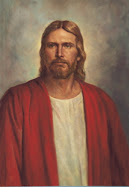Another very well-beloved hymn today because of its beautiful lyrics which teach a wonderful lesson, its very singable tune which is quite far from the typical chord-chord-chord, and its tie to a significant event in our Church's history as this was the hymn Joseph Smith, Jr. asked John Taylor to sing while they were imprisoned in Carthage Jail, where only a few hours later Joseph would be killed by a mob. The first five verses tell different stories of how the singer provides service to someone in need. It is a toss up whether it could be read as the same poor wayfaring man in each verse, or several different men the singer is helping. At least until you get to the last few verses. The symbolism is, of course, to serve poor wayfaring person who come across our path whom we are able to help. In either case, the singer who is serving the wayfarer always finds themself very blessed and in unexpected ways because of the sacrifice given to offer these services. Then verse 6 and 7 are the concluding story, the most beautiful and uplifting to me when the singer offers the ultimate sacrifice of their own life if needed, and then the Savior reveals Himself to basically say "Well done thou good and faithful servant" because all of the service rendered to the wayfarer(s) was unto Him. So, so beautiful.
The hymn, being 7 verses long, (and 5 lines each verse!) is almost always shortened. In any performance or recording I have ever heard, all but 1 have shortened. "Understandable" in some cases because some in congregations who are not fans of singing get bored or tired (the latter being much more understandable to me than the first). Now, with those 5 verses being separate stories, it makes sense to leave out 1 or 2 or 3 and still convey the message of serving and how that service is rendered unto God, too. But many, especially in congregations, choose to leave off the last 4 and only sing the first 3. In doing that, they leave off the most beautiful, sweet part of the entire hymn!
So it would be more seemly to leave out verses in the middle. But, ahhh, leaving out! So painful to me. In that case it is like saying "Once upon a time there was a beautiful princess. And they lived happily ever after." Where is the middle? The fabulous part of the substance of the story or message. A wonderful, beautiful ending is great, but it lacks its poignancy and significance if what led up to it is taken away. Plus! Then you have to choose which of the wonderful verses to leave out.
Verse 1: Introducing the wayfarer(s) who often crosses the path--and how could we turn down offering them help?--Something in his eye that won my life; I knew not why
Verse 2: Sacrificing the need for food (basic, vital need)--I gave him all; he blessed it
Verse 3: Sacrificing the need for water (basic, vital need)--I ran and raised the suff'rer up
Verse 4: Sacrificing comfort to offer shelter and rest (another basic need--not necessarily the comfort part, though that helps a great deal in getting a proper rest, but in shelter when one has very little in that to offer as well)--To bid him welcome...and cheered my guest
Verse 5: Sacrificing one's own need of healing to heal another (which contains some of my favorite, more personal-connection lines "I had myself a wound concealed But from that hour forgot the smart, And peace bound up my broken heart"_
Verse 6: To see this simple person falsely accused and condemned, and stand up for them at cost of reputation and moreso at cost of life--The flesh was weak; my blood ran chill, But my free spirit cried, "I will!"
Verse 7: The Savior accepting all of our sacrifices and deeds--"Of me thou hast not been ashamed."
I think it is a shame that we do not sing all 7. And in all honesty, I have not picked this hymn yet in my time as music director because I don't want people to be grouchy because we sing all the verses of this amazing hymn.
From the history book
The poem was called "The Stranger" and first appeared in 1834 in an anthology of verse. I had always wondered if the author was LDS, because of the time when the Saints embraced the hymn and began to sing it. But it sounds as if he was not. Which is fine, as these words illustrated a New Testament scripture that is relevant to all of us. The book, of course, mentions the significance of the hymn because of our Church history ties. The composer was a reverend in New York, and our current tune is "a rather elaborate variation" of it.




No comments:
Post a Comment